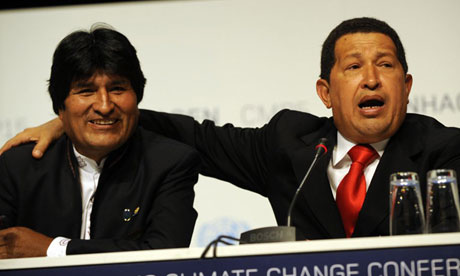Colaboré en esta nota
Tributes to Hugo Chávez flow from South American leaders
Deep mourning for presidents who shared vision of 'Bolivarian revolution', while non-allies praise role in regional unity

Evo Morales, the Bolivian president, with Hugo Chávez during Copenhagen climate talks in 2009. Photograph: Olivier Morin/AFP/Getty
Tributes and condolences after the death of Hugo Chávez have flowed in from South America, where many saw the Venezuelan president as the inspiration behind increased regional intergration and the remarkable political gains of leftwing parties since the Venezuelan president began his "Bolivarian revolution".
Bolivia announced seven days of mourning. The presidents of Brazil and Argentina cancelled a summit. In Colombia Chávez was hailed as the decisive figure in that country's ongoing peace process; in Ecuador as a revolutionary figurehead; and in Chile – which has taken a different political path – as a key figure in regional intergration.
In Cuba the official evening newscast devoted its entire programme to Chávez as the country came to grips with him being outlived by Fidel Castro, 86, who took Cuba into communist rule and endorsed Chávez as his revolutionary successor in South America.
The government now led by Fidel's brother Raul declared three days of mourning and eulogised Chávez, saying his "Bolivarian revolution" was "irreversible" and that Cuba would continue to "accompany Venezuelans in their struggles".
The government now led by Fidel's brother Raul declared three days of mourning and eulogised Chávez, saying his "Bolivarian revolution" was "irreversible" and that Cuba would continue to "accompany Venezuelans in their struggles".
In capitals throughout the region people thronged to Venezuelan embassies to express their solidarity. "The loss is irreparable. He was a great leader and friend of Brazil," said Brazil's president, Dilma Rousseff. "President Chávez will live on in the empty space that he filled in the heart of history and the struggle of Latin America."
Rousseff has cancelled a planned visit to Patagonia where she had been due to hold a summit with Argentina's president, Cristina Kirchner. The two leaders are among a throng of leftist politicians who came to power in the wake of Chávez's first election victory in 1998 and were influenced by the style and policies of the charismatic Venezuelan.
They are almost certain to attend the state funeral, which is expected to take place in the coming days.
Evo Morales, the president of Bolivia and a close ally, departed for Caracas soon after hearing the news, according to the Spanish news agency EFE. "We are hurt. We are devasted," Morales said. "We feel Hugo Chávez is more alive than ever. He will continue being an inspiration for people who fight for liberty."
The government of Ecuador – another Andean neighbour that has followed a similar path – said it felt Venezuela's loss as its own. "Chávez will continue lighting the Latin America revolution with his vision, his commitment, his brightness and his love of the people. We will keep him in our hearts," said the minister of foreign affairs, Ricardo Patiño.
The Colombian president, Juan Manuel Santos, said the death of Chávez was a loss not just for Venezuela but for the region and his country. With assistance from its neighbours Colombia has seen some recent steps towards peace after a decades-long conflict between the government and Farc armed rebels. "If we are moving towards peace it's due to the unlimited dedication of Chávez and the government of Venezuela," Santos said in an interview with local television.
Even leaders who have been politically distant from Bolivarian socialism expressed condolences and recognised the role Chávez played in strengthening regional ties. Sebastián Piñera described the Venezuelan as a man who helped intergrate Latin America. He said the death – coming after Chávez was moved from a hospital in Cuba back to Caracas – was in a manner that Chávez anticipated. "He once told me in a private dialogue in Santiago that he wanted to die in his country. I remembered that when he went back to Venezuela on 18 February," said Piñera.
Luiz Felipe Lampreia, who was Brazilian foreign minister from 1995 to 2001, agreed that it would be difficult to replace Chávez. "He reinvented the concept of the Latin American left, like Perón before him," Lampreia said. "All the others lack the power and qualities to fill the gap. I guess that there will be a loss of energy in Venezuela's leadership."
In Buenos Aires hundreds of young supporters gathered outside the Venezuelan embassy within hours of the news. Some waved political banners. Others wrote messages of condolence and promises to fight on. "Long live the revolution!" said one.
On streets, at home and in bars supporters and admirers expressed dismay and – despite Chávez' long hospitalisation – shock at his death.
Opponents – and the divisive political icon had many – were quietly relieved that such a dominant political figure had departed the world stage.
Some said they would remember the moment as vividly as a generation of their US counterparts could recall exactly where they were on hearing the news that President Kennedy had been shot. Many have already been turning their attention to what comes next for Chávez's chosen successor: the vice-president, Nicolas Maduro.
"I will recall the cafeteria where I heard this news," said Agustin D'Attelis, a senior economic adviser to the Argentinian government, who was being interviewed by the Guardian when the news broke. "This will be a big change for the region and for Argentina. We have built up close commercial and political ties. The cultural battle against neoliberalism will be difficult without Chávez."
Additional reporting by Sebastián Lacunza, Luciana Bertoia and Marcela Bial